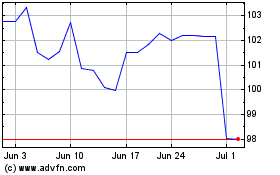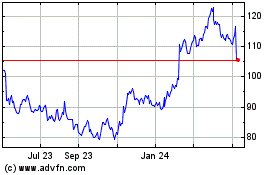InBev Plans $30 Billion Bond Sale
January 12 2016 - 6:30PM
Dow Jones News
Brewing giant Anheuser-Busch InBev NV is planning to sell
roughly $30 billion in bonds Wednesday in a deal that would rank as
the second largest on record, underscoring the strength of the
corporate-debt market despite turmoil in certain sectors.
Some investors and analysts say the company, which is buying
rival SABMiller PLC for more than $100 billion, could ultimately
sell about $55 billion in new bonds to help pay for the
acquisition. The company could sell the entire amount in its sale
on Wednesday, but investors say it is more likely to sell roughly
$30 billion in the U.S. market and the remainder in other
currencies overseas or at a later date.
Investors say they expect high demand for the debt, given the
company's investment-grade ratings, the relatively high yields that
should be offered on the new bonds, and the company's exposure to
consumer spending, a bright spot in the U.S. economy. Other big,
household names such as Walt Disney Co. and Ford Motor Co. have
sold investment-grade bonds this month, demonstrating investor
appetite for corporate debt despite price swings in stocks and the
market for junk bonds, which carry lower ratings and higher
risk.
"In volatile times, the market wants something simple and
relatable to invest in," said Matt Brill, a portfolio manager for
fixed income at asset manager Invesco Ltd., which oversees roughly
$791 billion. "Beer bonds are exactly that."
AB-InBev declined to comment on the sale.
The company's bond sale would signal that the bond boom of the
last seven years isn't over yet, despite the Federal Reserve's
decision in December to raise interest rates from near zero. Many
companies plowed into debt markets in recent years to take
advantage of ultralow interest rates, using the proceeds to pay for
an acquisitions boom or to buy back stock.
A $30 billion offering would rank behind Verizon Communications
Inc.'s $49 billion bond sale in September 2013, but it would beat
out a $21 billion offering from Actavis PLC in March of last
year.
Portfolio managers tend to like big bond sales from highly rated
firms because the bonds, with so many investors owning the debt,
are relatively easy to trade. A bond sale of this size will also
carry higher yields compared with debt from similar firms because
the company needs to entice investors to participate in the
sale.
Sentiment in the broader corporate-bond market has improved
since mid-December, when a major selloff hit the junk-bond market
amid concerns that low commodity prices would push many firms into
default. Investment-grade bonds weakened as well. But the market
stabilized in the following weeks, with investors saying they
expected modest economic growth in the U.S. to continue into 2016,
which should help many companies grow their revenue.
Write to Mike Cherney at mike.cherney@wsj.com
(END) Dow Jones Newswires
January 12, 2016 18:15 ET (23:15 GMT)
Copyright (c) 2016 Dow Jones & Company, Inc.
Walt Disney (NYSE:DIS)
Historical Stock Chart
From Aug 2024 to Sep 2024

Walt Disney (NYSE:DIS)
Historical Stock Chart
From Sep 2023 to Sep 2024
